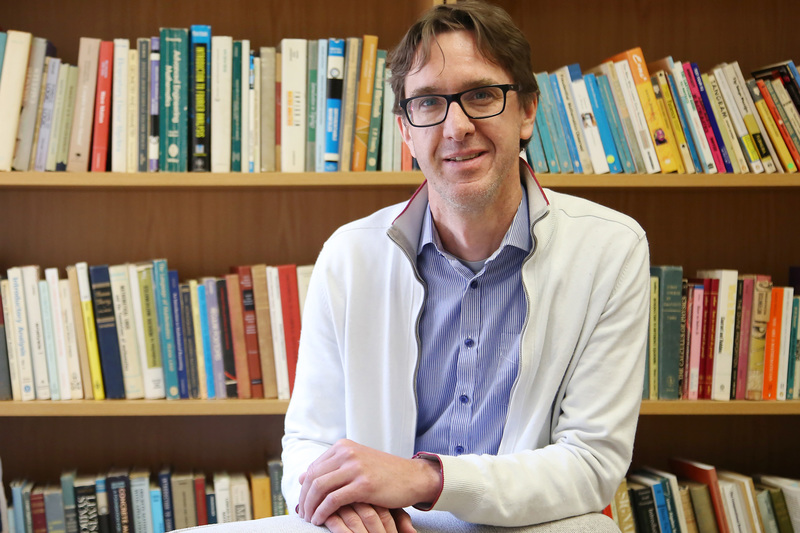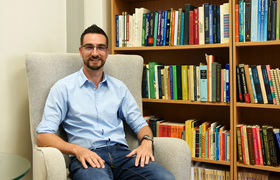Research shines a light on financial markets
03 October 2018 | Story Kim Cloete. Photo Je’nine May. Read time 7 min.
Scientists from the University of Cape Town (UCT) and the University of the Witwatersrand (Wits) have collaborated on provocative analysis of financial markets, which could reveal a deeper understanding of what drives their predictability.
The research was completed by Fayyaaz Loonat, of the School of Computer Science and Applied Mathematics at Wits, in conjunction with Associate Professor Tim Gebbie from the Department of Statistical Science at UCT.
The question Loonat and Gebbie directly considered was how an investor should distribute their wealth among several stocks and trading strategies in a stock market on a given trading day. Their premise was that what has happened in the past is likely to happen again, and secondly, that a pragmatic investor is concerned only with maximising their wealth, irrespective of risk.
They first worked to independently replicate prior studies, before extending the work to a new data set with various algorithm refinements.
Gebbie said they were interested in unraveling how an ecosystem of components works together in financial markets.
“We wanted to understand the various players in a financial market … who drives information and who drives predictability – but from a data-driven perspective, a positivist (how the world is) rather than normative perspective (how we think it is, or would like it to be).”
The approach they used was based on the work of information theorist Thomas Cover and his idea of universal portfolios, combined with a pattern-matching algorithm implemented in an optimised manner on novel data.
In this approach, each trader or investment agent is represented by a strategy that uses different methods to define similarities or patterns in the market across time, and the sole objective of trading agents is to maximise their long-term wealth.
“We wanted to understand the various players in a financial market … who drives information and who drives predictability – but from a data-driven perspective.”
Top-down versus bottom-up
Gebbie said the research found there are challenges when financial markets are controlled, both from a top-down and a bottom-up approach.
“What is new, from our perspective, is this whole top-down causation versus the bottom-up elements. If the system is very rigidly pushed down from the top by regulation in any enforced dynamic, it will fragment. It will continue to fragment the more you push it down. The very act of trying to centralise control breaks the system.”
A similar fragmentation can happen from the bottom up when people push for greater control.
“It’s another form of centralisation and control as you are allowing the extremes in the system to dominate the dynamics,” he explained.
“Whether it is a bottom-up centralisation or top-down centralisation you are just fragmenting the system and driving it into crisis. That’s what happens in a financial crisis. There’s this tension between these different modes of centralisation … be it from liquidity, be it from monopolies, or whatever.
“The kind of regulation we have in the trading world is completely not fit for purpose,” he said, adding that there is often collusion between the dominant components of a system and those setting the rules.
“I do think we are seeing financial crises increasing globally and ... political crises, because the top-down centralised state has failed. The nation state is failing and this is an artifact of globalisation.
“What happens in financial markets is just a microcosm of this. The more you regulate to control or protect interest groups, the more you actually create crisis.”
Dynamic decentralisation
He suggested that it may be better to rather let the system control itself through “dynamic decentralisation”.
“This is most certainly not a call for deregulation, nor laissez-faire, but regulations aimed to enable, to manage inequality, to empower parts of the system that actually work or add value to people’s lives.”
Loonat and Gebbie believe it is important to understand stock markets through the types of strategies and market properties that can be induced by top-down regulation, as well as various top-down barriers to entry.
This is not only because it can provide simple computer-based learning agents the ability to outperform human traders and investors, but can also teach us something about how institutions create and destroy predictability in financial markets.
The research is also important when learning how to manage big-data pipelines and high-performance computing infrastructure, and is a way of showing that even when predictable patterns seem to exist, they are not easily profited from because of various business models and institutional constraints.
The study, “Learning zero-cost portfolio selection with pattern matching”, was published recently in PLOS ONE, a peer-reviewed open-access journal.
“It’s very exciting to be able to unravel markets from a scientific perspective”.
Gebbie said it’s very exciting to be able to unravel markets from a scientific perspective.
Learning “hard sciences”
Getting an understanding of the social sciences from statistics and data is extremely valuable in understanding the shift towards a modern, hi-tech economy and financial systems.
According to Gebbie, it will be a vital skill moving forward. He believes that the “hard sciences” of studying subjects such as statistical science and mathematics will stand graduates in good stead for the future.
“As we move into the next decade or so, people will realise that artificial intelligence (AI) learning is more nuanced than we think it is. It’s about building stuff that works. I do think the pendulum is swinging to the hard-core tech phase. The hard sciences prepare you for building stuff that works.
“Students who are excited about data-driven technology should probably ... do as much maths, stats and computing as they can in conjunction with their other interests.”
Students interested in this type of research are encouraged to study undergraduate majors in statistics, computer science and applied mathematics from a science and engineering perspective to be able to engage with the required data science, computer science, analytics and mathematical statistics at the postgraduate level.
The Department of Statistical Science at UCT offers several two-year Master of Science (MSc) programmes related to data-intensive finance, statistical finance, machine learning in finance and interdisciplinary data science.
“Students will learn about stock markets, how financial markets work and how to build models and systems from data. They can build things that can add value to themselves, other people and the world,” said Gebbie.
 This work is licensed under a Creative Commons Attribution-NoDerivatives 4.0 International License.
This work is licensed under a Creative Commons Attribution-NoDerivatives 4.0 International License.
Please view the republishing articles page for more information.










